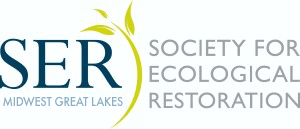2021 Student Grant Program Request for Proposals Now Open
The Society for Ecological Restoration Midwest-Great Lakes Chapter (SER MWGL) 2021 annual student grant program is now requesting proposals. The application deadline is April 12, 2021.
The award program is open to all undergraduate and graduate students who are members of the SER Midwest-Great Lakes Chapter* and attend institutions of higher education within the regional boundaries of the SER MWGL Chapter. The proposed work must occur within the SER MWGL Chapter regional boundaries.
Award winners will be notified by email on or before May 3 and announced on the SER MWGL Chapter blog.
See below for details.
The Student Grant Program offers 2 awards: a Research Grant supports student involvement in research in ecological restoration; an Implementation Grant supports student involvement in the implementation or management of an ecological restoration project. The Chapter will award two grants (one Research, one Implementation) of up to $2,000 each. The Research Grant will be awarded to an eligible student for research supplies, travel, equipment and other needs. The Implementation Grant will be awarded to an eligible student, student group, or student-oriented group for supplies, travel, equipment, outreach materials, and other items to support implementation of restoration practices. Grant funds cannot be used for travel to the SER MWGL annual meeting. The award winners will be announced on the chapter blog (https://restorationnewsmidwest.wordpress.com) and the recipients will be expected to present an oral or poster presentation on their work at the 2022 Annual Chapter Meeting. Award winners will receive waived annual meeting registration (limit 1 per award) for the 2022 Annual Chapter Meeting.
Application:
- Eligibility – All undergraduate and graduate students who are members of the SER Midwest-Great Lakes Chapter* and attend institutions of higher education within the regional boundaries of the SER MWGL Chapter. The proposed work must occur within the SER MWGL Chapter regional boundaries.
- Applicants should clearly state the grant award type (Research or Implementation) for which they are applying.
- Proposal (3pgs) – Proposals should not exceed 3 pages (no smaller than 11pt font with 1” margins), including all text, figures and literature cited. Proposals must clearly describe how the funds will be used, the need for the funds, and how the proposed activities support the Chapter’s mission. Proposals should include the following:
- Research Grant
- Introduction – Provide scientific justification and significance of the research and specify research questions, objectives or hypotheses.
- Methods – Detail the experimental design, site location(s), data collection methods, and statistical analysis.
- Anticipated Results & Discussion – Explain anticipated results and potential interpretation and address how the results can be applied to further our understanding of the science and practice of ecological restoration.
- Literature Cited – Follow the format of Restoration Ecology.
- Implementation Grant
- Introduction – Provide an overview of the restoration project and the specific objectives for how the planned activities will be implemented with the requested funds. This section should also describe the goals, history, composition, and past activities of the associated student group, if applicable.
- Planned Activities – Describe the planned activities and restoration practices that will be implemented with the requested funds.
- Anticipated Benefits – Explain anticipated benefits and how the planned activities will contribute to furthering our understanding of the practice of ecological restoration.
- Literature Cited (if needed) – Follow the format of Restoration Ecology.
- Research Grant
- Budget & Justification (1pg) – A complete, detailed list of supplies, estimated travel, and other cost estimates for the project. Include a statement indicating any secured or anticipated pending funding for the project. SER MWGL Chapter will award up to $2,000 for a Research Grant and up to $2,000 for an Implementation Grant. (The budget request should not include funds to cover registration or travel expenses to the SER MWGL annual meeting.)
- Letter of Support
- Research Grant – A letter from an advisor highlighting the student’s academic ability and accomplishments, the significance of the student’s research and their ability to complete the proposed project.
- Implementation Grant – A letter from an advisor, mentor, community member, or other supporting partner highlighting the student’s or group’s accomplishments, available resources, and ability to complete the proposed project.
- Submission of Application
- All application materials should be emailed as doc, docx, or pdf files to: mwgl.ser@gmail.com
- Use the subject line “Student Research Application” for Research Grants
- Use the subject line “Student Implementation Application” for Implementation Grants
- Applicants should include their full name, institutional mailing address, email address and phone number in the body of the email.
Application Deadline: April 12, 2021
Award winners will be notified by email on or before May 3 and announced on the SER MWGL Chapter blog (https://restorationnewsmidwest.wordpress.com).
* The SER Emerging Professionals membership ($37; formerly called Student membership) includes membership in both SER and SER MWGL chapter (MWGL must be selected as the regional chapter when joining). Associated benefits include the discounted registration prices at Annual Chapter Meetings and SER World Conferences, SER bi-monthly newsletter, 25% off Island Press publications, 35% off John Wiley & Son publications, and more. For additional information on membership see https://www.ser.org/page/IndividualMembership.
The Society for Ecological Restoration Midwest-Great Lakes Chapter (SER MWGL) was recognized as an SER Regional Chapter in March 2008 and serves Ohio, Indiana, Michigan, Illinois, Wisconsin, Minnesota, and Iowa. Our mission is to promote the science and practice of ecological restoration to assist with the recovery and management of degraded ecosystems throughout the Midwestern and Great Lakes region of the United States.
